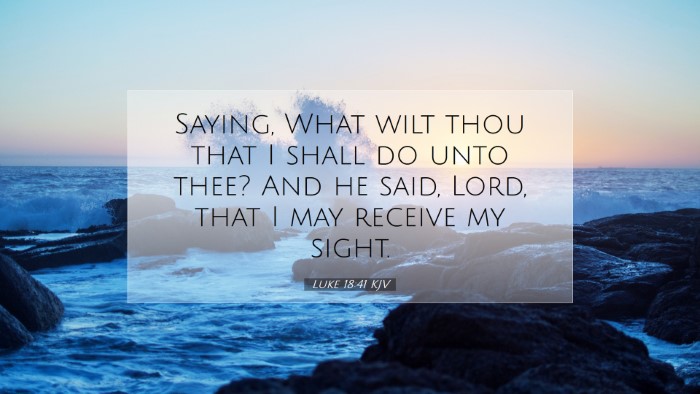Commentary on Luke 18:41
Bible Verse: "What do you want me to do for you?" "Lord, I want to see!"
Introduction
This verse, situated within the narrative of Jesus healing the blind beggar near Jericho, presents a profound insight into the nature of faith and the essence of divine interaction. Commentaries from historical figures like Matthew Henry, Albert Barnes, and Adam Clarke delve into the spiritual implications of this exchange, making it particularly useful for pastors, students, theologians, and scholars.
Exegesis and Interpretation
Luke 18:41 offers a dialogue that encapsulates the theme of desperation for divine mercy and the clarity of true sight. Here, we will explore the key elements of this verse:
1. The Query of Jesus
“What do you want me to do for you?” This question posed by Jesus is both profound and revealing. According to Matthew Henry, this inquiry implies that God often waits for our expression of need. It is a reminder that prayer is fundamentally about articulating one’s desires to God. Jesus, in His omniscience, knew the heart of the beggar but still asked this question to draw out the man's faith (Matt. Henry's Commentary).
2. The Response of Faith
The beggar’s response, “Lord, I want to see!” reflects the essence of faith and need. As Albert Barnes notes, the request for sight symbolizes not only physical healing but a deeper spiritual enlightenment. This plea illustrates the fundamental desire for awareness and understanding, both physically and spiritually. The beggar's identification of Jesus as "Lord" and his specific request highlights his recognition of Jesus' authority and power to heal.
3. The Significance of Sight
The request for sight is laden with theological depth. Adam Clarke points out that sight can be seen as a metaphor for spiritual revelation. In a broader context, the Christian journey often involves moving from spiritual blindness to illumination. The beggar's desire to see can thus be interpreted as a longing for a deeper understanding of God’s truth and presence in his life.
Theological Insights
- The Nature of Faith: Faith is often demonstrated through bold and specific requests, as seen in the beggar's plea. This reflects Hebrews 11:1, where faith is the assurance of things hoped for.
- Jesus’ Compassion: The gentle inquiry by Jesus reveals His compassionate nature, emphasizing that He is not only aware of our needs but actively desires to engage with us to fulfill them.
- Spiritual Insight: The request for sight underlines the importance of spiritual insight in the life of a believer. It urges a soul to seek not only physical healing but also insight into God’s will and purpose.
Practical Applications
This short yet profound exchange between Jesus and the blind beggar holds several practical applications for modern readers:
- The Importance of Vulnerability: Expressing our needs to God requires vulnerability, which is a necessary step for healing and restoration.
- Awareness of Spiritual Blindness: Encourages self-examination to identify areas of spiritual blindness in our lives.
- Expectation in Prayer: Faith should manifest as expectancy in our prayers, as seen in the beggar's assertive request.
Conclusion
Luke 18:41 lays out a beautifully orchestrated moment between Jesus and a desperate seeker of truth and healing. The commentary insights from Matthew Henry, Albert Barnes, and Adam Clarke collectively underscore the richness of this brief dialogue. It encapsulates the essence of prayer, the nature of faith, and the grace available through Christ. For pastors, students, and scholars, this passage serves as a reminder to approach God with both humility and bold expectations, recognizing that true sight—both physical and spiritual—comes through an earnest encounter with Jesus.


